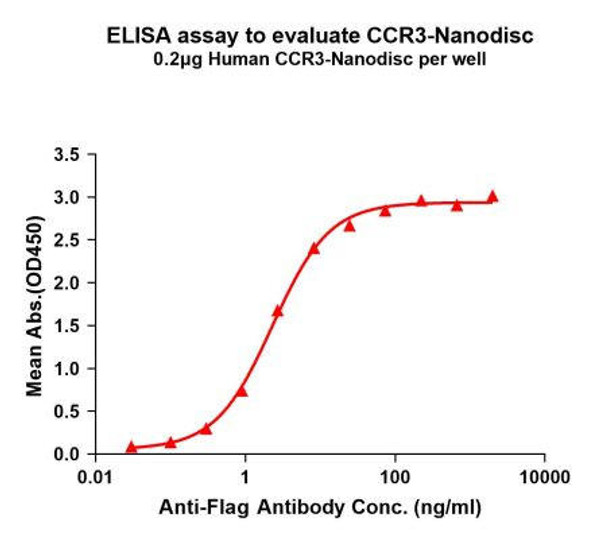Description
system_update_altDatasheet
| Product name | Human CCR3 full length protein-synthetic nanodisc |
| Size: | 10ug |
| Product SKU: | HDFP056 |
| Product Category | Full Length Transmembrane Proteins |
| Target: | CCR3 |
| Uniprot: | P51677 |
| Description: | Human CCR3 full length protein-synthetic nanodisc |
| Molecular Weight: | The human full length CCR3 protein has a MW of 41.0 kDa |
| Protein Family: | Druggable Genome, GPCR, Transmembrane |
| Protein Pathways: | Chemokine signaling pathway, Cytokine-cytokine receptor interaction |
| Storage & Shipping: | Store at -20°C to -80°C for 12 months in lyophilized form. After reconstitution, if not intended for use within a month, aliquot and store at -80°C (Avoid repeated freezing and thawing). Lyophilized proteins are shipped at ambient temperature. |
| Synonyms: | CC-CKR-3; C C CKR3; CD193; CKR 3; CKR3; CMKBR3 |
| Expression System: | HEK293 |
| Formulation: | Lyophilized from nanodisc solubilization buffer (20 mM Tris-HCl, 150 mM NaCl, pH 8.0). Normally 5% - 8% trehalose is added as protectants before lyophilization. Please see Certificate of Analysis for specific instructions. |
| Background: | The protein is a receptor for C-C type chemokines. It belongs to family 1 of the G protein-coupled receptors. This receptor binds and responds to a variety of chemokines, including eotaxin (CCL11), eotaxin-3 (CCL26), MCP-3 (CCL7), MCP-4 (CCL13), and RANTES (CCL5). It is highly expressed in eosinophils and basophils, and is also detected in TH1 and TH2 cells, as well as in airway epithelial cells. This receptor may contribute to the accumulation and activation of eosinophils and other inflammatory cells in the allergic airway. It is also known to be an entry co-receptor for HIV-1. This gene and seven other chemokine receptor genes form a chemokine receptor gene cluster on the chromosomal region 3p21. Alternatively spliced transcript variants have been described. |
| Delivery: | In Stock |
| Usage | Research use only |












